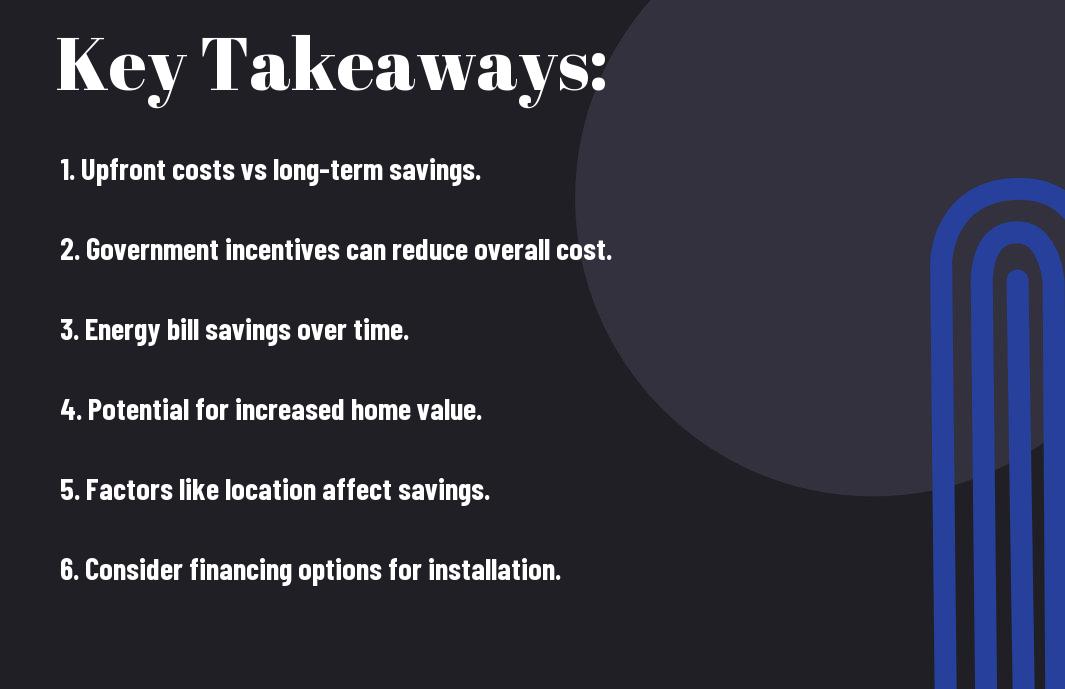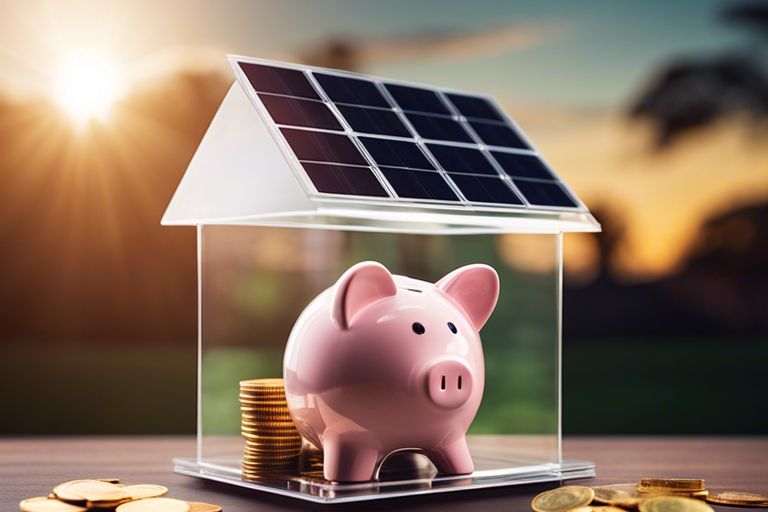Many factors determine whether you save money going solar. Analyzing the costs and benefits is imperative before making the switch. According to a study, calculating how much money solar panels can save you is a crucial step in the decision-making process.

Key Takeaways:
- Savings on energy bills: By using solar power, you can significantly reduce or even eliminate your electricity bills.
- Return on investment: While the initial cost of installing solar panels can be high, over time, the savings on energy bills can provide a good return on investment.
- Government incentives: Many governments offer incentives and tax credits for installing solar panels, which can further reduce the overall cost.
- Increased home value: Homes with solar panels are often valued higher on the real estate market, providing an additional financial benefit.
- Environmental benefits: In addition to the cost savings, switching to solar power can also help reduce your carbon footprint and contribute to a more sustainable future.

The Promise of Solar Energy
The Environmental Benefits
With solar energy, you can significantly reduce your carbon footprint. By switching to solar power, you are choosing a clean, renewable energy source that produces no greenhouse gas emissions during operation. This means that your household can lower its reliance on fossil fuels, contributing to a cleaner environment for future generations. Additionally, solar panels have a long lifespan, further reducing the environmental impact of constantly manufacturing and disposing of traditional energy sources.
The Economic Incentives
Promise: There are various economic incentives that come with embracing solar energy. One of the most significant advantages is the opportunity to save money on your utility bills in the long run. By generating your electricity through solar panels, you can decrease your reliance on the grid, ultimately leading to lower monthly energy costs. Additionally, many governments offer financial incentives, such as tax credits or rebates, to homeowners who invest in solar energy systems.
Understanding the economic benefits of solar energy can help you make an informed decision about whether it’s the right choice for your home. While the initial cost of installing solar panels may seem steep, the long-term savings and environmental benefits make it a promising investment for those looking to reduce their carbon footprint and save money on energy expenses.

The Cost of Going Solar
Initial Investment Costs
One of the main considerations when thinking about going solar is the initial investment costs. Installing solar panels on your property involves a significant upfront expense. The cost can vary depending on factors such as the size of the system, the type of panels, and any additional equipment needed. While the initial investment may seem daunting, it’s imperative to remember that there are various financial incentives and rebates available that can help offset the initial costs.
Ongoing Maintenance Expenses
Maintenance is another aspect to consider when evaluating the cost of going solar. While solar panels are known for their durability and low maintenance requirements, there are still some ongoing expenses to keep in mind. These expenses typically include periodic inspections, cleaning of the panels, and in some cases, the replacement of parts due to wear and tear. It’s important to factor in these maintenance costs when calculating the overall savings of going solar.
Going solar involves a balance between the initial investment costs and the ongoing maintenance expenses. By understanding both aspects, you can make an informed decision that not only benefits the environment but also your finances in the long run.
Savings through Electricity Bills
Reduced Energy Consumption
All your life, you’ve been used to paying those hefty electricity bills. But once you switch to solar power, you’ll notice a significant drop in your monthly expenses. By generating your own electricity, you’ll rely less on the grid, resulting in lower energy consumption and ultimately reducing your electricity bills.
Net Metering and Feed-in Tariffs
Any surplus energy your solar panels produce can be fed back into the grid, earning you credits through net metering or feed-in tariffs, depending on where you live. This means that not only are you saving money on your electricity bills, but you also have the opportunity to earn additional income by contributing clean energy to the grid.
Through net metering, you can often get credited for the excess electricity your system produces during the day, which can offset the energy you consume at night or during cloudy days. Feed-in tariffs work slightly differently, as they involve receiving payment for the electricity you generate, encouraging you to produce more clean energy.
Another advantage of net metering and feed-in tariffs is that they provide a way for you to make your solar investment even more financially beneficial in the long run. By maximizing the use of your solar panels and taking advantage of these programs, you can continue to save money and even potentially turn a profit on your solar energy system.
Incentives and Rebates
Keep in mind that when you invest in solar panels, you may be eligible for various incentives and rebates that can help offset the initial cost. These incentives can significantly reduce the overall price of your solar energy system, making it a more cost-effective option in the long run. When considering going solar, it’s necessary to explore these potential savings to maximize your financial benefits.
Government Tax Credits
Rebates: One of the most significant incentives for going solar is the Federal Investment Tax Credit (ITC), which allows you to deduct a portion of the cost of your solar energy system from your federal taxes. Currently, the ITC is set at 26% of the total system cost, but it’s necessary to act quickly as the credit is set to decrease in the coming years. Taking advantage of this tax credit can lead to substantial savings on your solar investment.
State and Local Incentives
Incentives: In addition to federal tax credits, many states and local governments offer their incentives to promote solar energy adoption. These incentives can take the form of rebates, performance-based incentives, or sales tax exemptions. By leveraging these programs, you can further lower the upfront cost of installing solar panels on your property.
Local incentives can vary widely, so be sure to research what programs are available in your area. Some local utilities may offer cash rebates for installing solar panels, while others may provide production-based incentives that reward you for the electricity your system generates. These additional savings can make a significant difference in the overall cost-effectiveness of your solar investment.
The Impact of Location
Once again, exploring whether solar panels truly save you money takes us to the crucial factor of location. The amount of sunlight your area receives directly impacts the efficiency of your solar panels. For a detailed look at how solar irradiance and climate influence your savings, check out Do Solar Panels Really Save Money?.
Solar Irradiance and Climate
Location plays a significant role in determining how much sunlight your solar panels can harness. Areas with higher solar irradiance levels and clearer skies are more conducive to generating abundant solar energy. Regions with consistent sunshine throughout the year tend to benefit more from solar panel installations, leading to potentially greater savings on your energy bills. Understanding the solar potential of your location is key to estimating the financial benefits of going solar.
Local Policies and Regulations
With solar energy gaining traction, many local governments have introduced policies and regulations to encourage its adoption. Some areas offer financial incentives, such as tax credits or rebates, to homeowners who install solar panels. These incentives can significantly reduce the initial cost of going solar, making it a more attractive investment for you. Additionally, certain regions have net metering policies that allow you to sell excess energy generated by your solar system back to the grid, further enhancing your savings potential.
As you consider going solar, researching the specific policies and regulations in your area can provide valuable insights into the financial benefits available to you. By taking advantage of these incentives, you can not only save money in the long run but also contribute to a more sustainable future for your community.
The Role of Energy Efficiency
Now, let’s probe into the important aspect of energy efficiency when considering the financial benefits of going solar. Energy efficiency plays a crucial role in maximizing the savings from your solar investment. By reducing your overall energy consumption, you can optimize the performance of your solar panel system and further decrease your utility bills.
Home Improvements and Retrofits
The first step towards improving energy efficiency in your home is through upgrades and retrofits. By enhancing the insulation, replacing old windows, updating appliances to energy-efficient models, or sealing drafts, you can significantly lower your energy usage. These improvements not only make your home more comfortable but also help your solar panels operate more effectively, leading to greater savings in the long run.
Behavioral Changes and Habits
Energy-efficient behavior and habits also play a vital role in maximizing the benefits of solar energy. Simple actions such as turning off lights when not in use, using appliances during off-peak hours, and adjusting your thermostat can contribute to significant energy savings. By being mindful of your energy consumption and making conscious decisions to reduce waste, you can amplify the financial advantages of going solar.
Understanding the connection between energy efficiency and solar power is key to realizing substantial savings on your utility bills. By combining home improvements, retrofits, and adopting energy-conscious habits, you can make the most of your solar investment and ultimately achieve a more cost-effective and sustainable energy usage.
Conclusion
Ultimately, the decision to go solar is not just about saving money; it’s also about making a long-term investment in a sustainable future for you and your family. While the initial costs may seem high, the benefits of residential solar electricity can provide significant savings on your energy bills over time. According to the U.S. Department of Energy, installing a solar energy system can increase your home’s value and decrease your monthly utility expenses. So, if you’re looking to reduce your carbon footprint and save money in the long run, going solar could be the right choice for you. To learn more about the benefits of residential solar electricity, check out Benefits of Residential Solar Electricity.
FAQ
Q: Do you actually save money by going solar?
A: Yes, in most cases, going solar can save you money in the long run. Although there is an initial investment in purchasing and installing solar panels, you can often recoup these costs through savings on your utility bills. Additionally, there are various federal and state incentives and rebates available that can further reduce the cost of going solar.
Q: How long does it take to see savings from solar panels?
A: The time it takes to see savings from solar panels can vary depending on factors such as your energy usage, the size of your solar panel system, and the cost of electricity in your area. On average, most homeowners see a return on their investment in solar panels within 5 to 10 years. After this initial payback period, you can continue to enjoy significant savings on your electricity bills for the remaining lifespan of your solar panel system.
Q: Are there financing options available for installing solar panels?
A: Yes, there are several financing options available to help make installing solar panels more affordable. Some common financing options include solar loans, solar leases, and power purchase agreements (PPAs). These options can help you spread out the upfront cost of going solar over time, making it more accessible to homeowners with varying budgets. Additionally, some financing options may require little to no money down, allowing you to start saving money on your electricity bills from day one.
